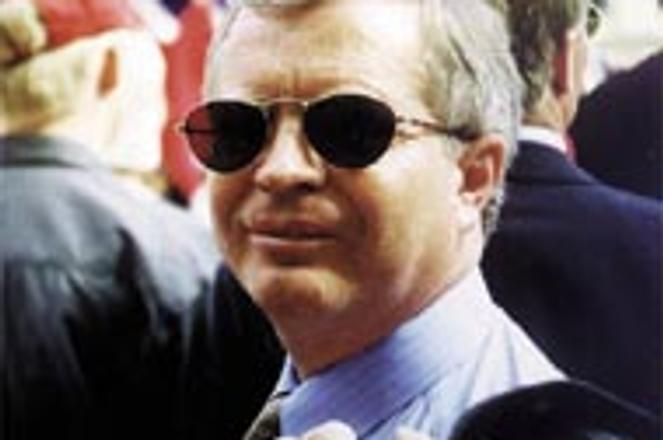Worn out. SDĽ leader Jozef Migaš heads for home after rally.Courtesy of SDĽ
A cold and raw afternoon greeted the crowd which turned out on September 15 to attend the election rally of the reformed communist Party of the Democratic Left (SDĽ). Held on Hviezdoslavovo Square in downtown Bratislava on a rainy autumn afternoon, the rally limped painfully along on the shoulders of the exhausted SDĽ politicians.
"The clouds have gathered over Bratislava and the rain is coming down. But don't worry, my friends, it is our bright future that is raining on us!" said SDĽ Chairman Jozef Migaš to the crowd of several hundred people. Despite Migaš' optimism, the crowd thinned out as the rain began to fall more heavily.
But when the politicos jumped up on the stage, the moribund audience came to life - some people grinned, while a smattering of applause was heard occasionally. Seven male SDĽ deputies and one female - party vice-chairman Brigita Schmögnerová - tried to rouse the crowd with promises that the party would focus mainly on social issues, such as unemployment, wages and healthcare - the economic issues that have recently gripped the nation.
The SDĽ deputies had clearly taken the measure of their audience, a mostly middle-aged and lower-income crowd which felt a connection with the topics being discussed. But the energy level of both the politicians and the onlookers was never high enough to push back the pall cast by the rain and the darkening skies.
One of the last acts of the day was a group of teenagers - children of the SDĽ speakers - who recited to the crowd their scripts on "how it feels to have a parent in politics." They were greeted with indifferent applause, as the rally concluded with a final flourish from the stoic deputies.
"I'm exhausted. There has been so much of it," said Migaš backstage after the show, sitting down for an interview with The Slovak Spectator. The people leaving the rally also seemed exhausted.
Interview with Jozef Migaš:
The Slovak Spectator (TSS): How is the campaign going so far? Are you satisfied with the results?
Jozef Migaš (JM): So far I'm satisfied with the things that we set up before. The campaign is very exhausting, but we are very disciplined in fulfilling our demands. We have to rely on these rallies and similar means of promotion because there are big barriers in the public media, especially on STV, so our space in the media is rather limited. Therefore we keep touring the country at full speed and believe that this will be reflected in our successful election results.
TSS: Which steps would the SDĽ take or push through as part of a future government?
JM: First and foremost, the state apparatus will have to be cleaned up. We would make sure that the constitution and the law were followed and obeyed, that the drain of capital was stopped, that organized crime did not organize the running of the state - we would simply put everything in order. After that, we would deal with the country's economic and financial problems so that the social situation of Slovak citizens would improve. In the eight years that this country has been functioning under new conditions, the biggest shortcomings have appeared in the social sphere. Society is polarized, not only between rich and poor, the system of social welfare is insecure, there is a lack of employment opportunities, the standard of living of many people is decreasing, health care has collapsed, the school education system is dysfunctional due to lack of money. People's fundamental rights to a job, education and housing are fulfilled miserably. In a poll taken by an American agency, 54% of our citizens stated that the former [communist] regime performed better regarding the living standards of ordinary people.
TSS: Which Ministries would the SDĽ prefer to hold?
JM: The SDĽ is ready to take over any department, because the party has the best prepared representatives. Whether it is economy, social policy or power ministries such as defence or the interior, we are ready to take on every section of the governmental system, but it all depends right now on which partner we would be able to form a coalition with.
TSS: Which parties would the SDĽ be willing to enter a coalition with?
JM: Predominantly those parties that are willing to repair the mistakes that have recently been made and to undo the injustices that have occured. So, our partners would be the democratic powers which seek a more democratic, more socially secure and generally better life for the Slovak people.
TSS: How would the SDĽ motivate people to greater participation in public affairs, in reaching the aims the party has set?
JM: Well, I hardly can imagine that a great change could take place in Slovakia without the people's taking part in it. It is impossible that people not be involved in privatization processes directly, with wider access to control mechanisms and assessment of the results achieved in particular businesses. They absolutely must also have control over the state administration, and simply take part in running this country. This state has to be reached as the next level of democratic development.


